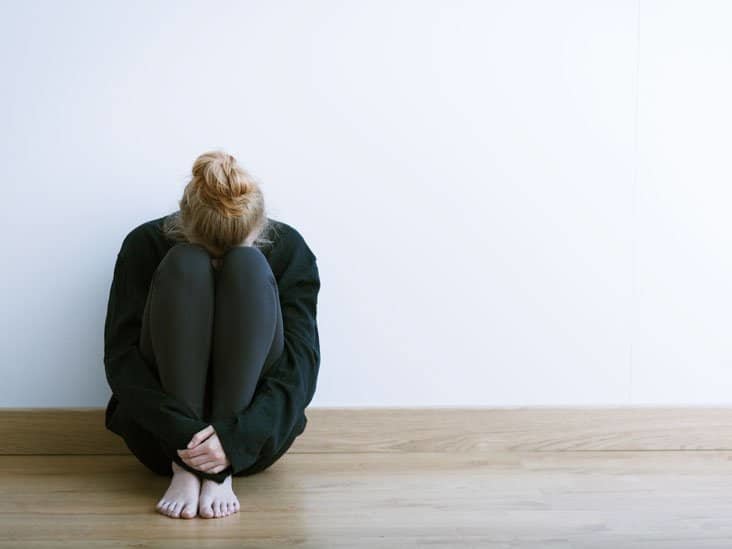
Symptoms Of Anxiety Disorder and Its Impact On Your Life

Generalized Anxiety Disorder (GAD) is a type of anxiety disorder that many people confuse with daily or routine stress. Feeling anxious while doing any work and feeling anxious all the time are two different things. When you have anxiety, you feel stressed or anxious all the time.
Sometimes it may be triggered by any event or other times you may not find a reason of becoming anxious. Stress in anxiety messes up with all aspects of your life and reduces the quality of your life drastically.

Generalized Anxiety Disorder (GAD) is a type of anxiety disorder that many people confuse with daily or routine stress
Anxiety begins with a thought that is fixated in your mind. When it affects all aspects of your life then it is referred to as an anxiety disorder. Anxiety does not only keep your mind occupied but also has physical symptoms associated with it, such as rapid heartbeat, sweating, twitches in stomach, shortness of breath or dizziness. Other than GAD, there are numerous types of anxiety disorders which include panic disorder, post-traumatic stress disorder, and depression.
If you feel like you are suffering from an anxiety disorder, then you should definitely seek treatment. The following symptoms are apparent in those suffering from anxiety disorder.
Your Anxiety Is Constant
Anxiety is constant when it keeps you on edge all the time. You might notice yourself feeling more anxious compared to members of your family or peers, especially in gatherings or events. Thoughts about upcoming events may keep your mind occupied for a long time, or all the time, before its actual occurrence, and this overthinking has a significant impact on the quality of your life.
Physical Symptoms Of Anxiety
It’s okay to feel anxious sometimes, but anxiety becomes a disorder when it also has physical symptoms associated with it. People have reported feeling various types of physical symptoms. Most commonly, people have reported feeling muscular pain in their arms or chest, dizziness or the feeling of constant fatigue. Some people also suffer from gastrointestinal issues due to long-term anxiety.
This is because the mind and gut has a very strong connection. Feeling constant anxiety keeps your nerves stressed all the time, and resultantly it has an impact on the gut system. Gastrointestinal issues, such as IBS, diarrhea, bloating, constipation, and heartburn are often reported by people suffering from anxiety disorder.

People have reported feeling muscular pain in their arms or chest, dizziness or the feeling of constant fatigue when suffering from anxiety
Lack Of Focus
Anxiety disorders hamper your ability to focus on things which require your utmost attention. A lot of effort is required in maintaining your focus when you have anxiety disorder. Focus is lost because other thoughts are fixated in your mind.
You Are Afraid of Getting Anxious
People suffering from anxiety disorders worry too much about becoming too anxious in certain situations. This is because there are many physical symptoms associated with anxiety which lead to a person feeling uncomfortable or embarrassed in those situations. People who are anxious all the time want to avoid the occurrence of such physical symptoms, such as activity in their gut due to the triggering of IBS, and in an effort of avoiding becoming anxious they instead become more anxious. All of this happens even before the event has taken place.
You Have Negative Thoughts about Yourself
Your self-esteem is lowered to a great extent when you have anxiety disorder. Because of continuous anxiousness, you lose confidence in yourself and you are always afraid of making wrong decisions. Your lack of focus makes you confused about the endless repercussions of your decisions. Thus, you rely upon others to make even some of the important decisions pertaining to your life.
Experiencing Withdrawal
If you are suffering from an anxiety disorder, then your mind is probably occupied with negative thoughts about negative outcomes coming from otherwise neutral situations. This keeps you anxious and worried all the time. You start losing interest in daily activities, and as a result become anti-social, making your anxiety worse by keeping yourself away from the people you love and who love you.
What to Do?
If you are experiencing a few of the above-mentioned symptoms, then it is possible you are leading yourself towards developing, or are already suffering from, an anxiety disorder. The best strategy to avert it is to accept your situation and face life as it comes. Positive thoughts and acceptance of different situations can mitigate these symptoms, as you will become more open to change, both positive and negative.
If you cannot help yourself, then it is best to take advice of qualified psychologist for treatment of your symptoms. They may refer to you a Cognitive Behavioral Therapy (CBT), stress management techniques, or medication such as antidepressants.
More in Mental Health
-
A Comprehensive Guide on How to Heal Anxious Attachment Style
If you often find yourself seeking constant reassurance from your partner or requiring endless validation to feel secure, you may be...
June 1, 2024 -
Why Is My Skin Peeling on My Face After Skincare? Here’s What You Need to Know
Experiencing skin peeling on your face after implementing a skincare routine can be perplexing and frustrating. This phenomenon, where the skin...
May 23, 2024 -
What Is a Mental Edge, and How Do You Get It?
Have you ever wondered why some individuals seem unshakably confident under intense pressure, finding a way to excel when it matters...
May 15, 2024 -
When to Worry About Varicose Veins? Here’s What You Need to Know
Varicose veins are a common issue, affecting about 20% of adults. They’re usually seen as unsightly blemishes on the legs but...
May 12, 2024 -
Why Is Discipline Important: The Ultimate Guide to the Importance of Discipline
Discipline is undoubtedly one of life’s most crucial character traits. It shapes how we approach tasks, manage our time, and...
May 3, 2024 -
Have I Fallen Out of Love or Am I Depressed? Everything You Need to Know
Have I fallen out of love or am I depressed? You’re not alone in this query. In the diversity of human...
April 26, 2024 -
What Does Lung Cancer Breath Smell Like?
Cancer is one of the most formidable diseases of our time, characterized by the uncontrolled growth of cells that invade and...
April 20, 2024 -
Making Major Life Changes? Discover 5 Crucial Things Before You Leap
Life changes are a pivotal part of our journey, marking the transition from one phase of life to another. These changes,...
April 13, 2024 -
The Surprising Benefits of Being Bored at Work
Are you bored at work? We’ve all been there, staring blankly at our computer screens, feeling an overwhelming urge to be...
April 6, 2024















You must be logged in to post a comment Login